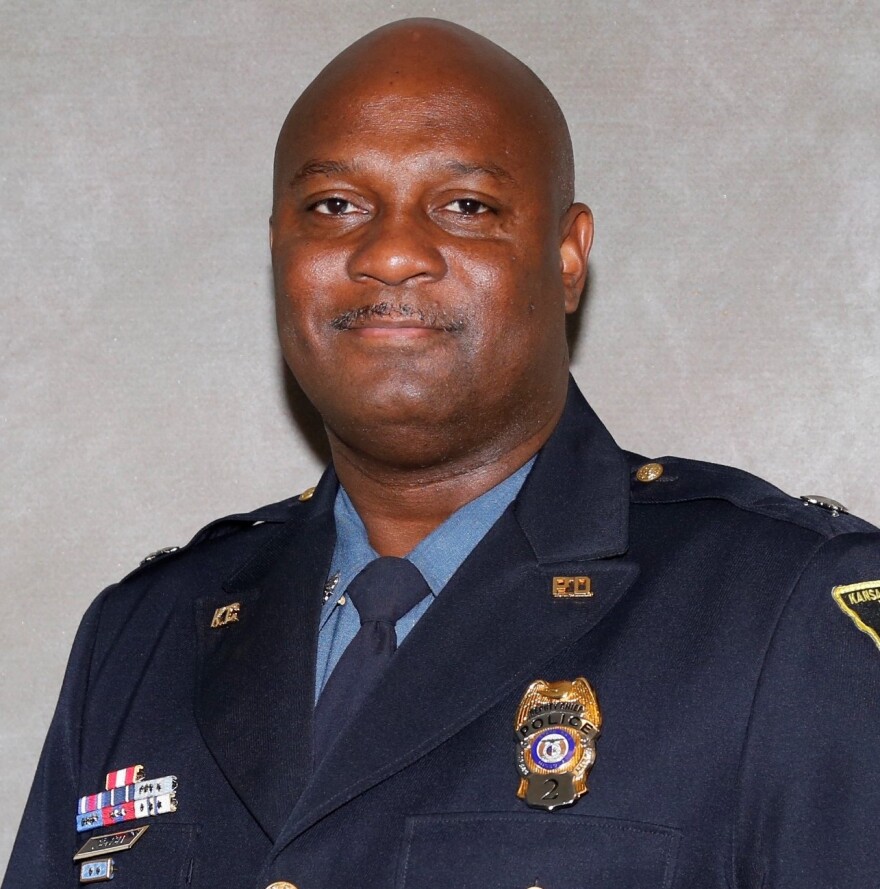Unified Government of Wyandotte County officials named Karl Oakman as the new police chief for the Kansas City, Kansas, Police Department on Friday.
Oakman crosses the state line from the Kansas City, Missouri, Police Department, where he served as deputy chief since 2017. He was with the department for nearly thirty years.
Oakman was chosen from a list of four finalists that included Pamela Waldeck, a deputy police chief in Kansas City, Kansas; Vince Davenport, an associate deputy director the U.S. Department of Justice; and Rich Austin, the police chief in Milton, Georgia.
Oakman, the city’s second Black police chief, grew up in Kansas City, Kansas. He said Friday that he was excited to return to his hometown.
“Looking at myself, a young man who grew up in the housing projects in Argentine, I'm returning about 30 years later as the chief of police of that same community,” Oakman said. “And that was only the result of adults taking the time to lead and guide me in the right direction.”
Oakman currently commands the KCPD Patrol Bureau and is responsible for the airport division, special operations, traffic, social services, crisis intervention and dentention services.
He was previously the commander of the administrative bureau and responsible for the information services, human resources, and the Kansas City Regional Crime Lab.
You're getting a good one, @KCKPDHQ. We're going to miss Deputy Chief Karl Oakman greatly. He has contributed so much to our city and department. We congratulate him on his selection as the new Kansas City, Kan., police chief. He's going to do great things & still be nearby! pic.twitter.com/pBr1wD1kKY
— kcpolice (@kcpolice) May 7, 2021
UG County Administrator Doug Bach said Oakman has led initiatives focused on community policing, youth engagement, inclusion, recruitment, and officer wellness.
Oakman said he wanted to continue these initiatives at the KCKPD when he begins his job in June.
“I have three simple goals for the Kansas City, Kansas, police department. That is strengthen relationships with all many members of the community to reduce crime, improve trust and recruiting, continue to develop a diverse professional workforce through transparency, officer wellness, training and career development,” Oakman said. “And last but not least, improve efficiency through the use of technology and resource allocation.”
Inheriting a department under scrutiny
Officials with More2, a local faith-based social justice organization, said Oakman’s appointment means the department was listening to their calls for a leader from outside KCKPD’s system.
Pastor Rick Behrens of Grandview Park Presbyterian Church said the new chief will be inheriting a department with decades of issues with corruption and abuse.
Chief Michael York has served as the Interim Police Chief for the KCKPD. He took over the department following the resignation of former Police Chief Terry Ziegler in September 2019.
In 2019, Ziegler faced protests and calls for his termination after a former cadet sued the KCKPD, claiming she was fired for reporting that an officer sexually assaulted her.
Later that year, an officer sued the UG for race and gender discrimination, hostile work environment and retaliation.
“It's a department that needs serious attention and I'm just hopeful that Oakman can bring about accountability and dramatic reform to this department,” Behrens said.
Behrens also pointed to the past conduct of Detective Roger Golubski, who has been accused of sexually exploiting vulnerable Black women and coercing some into providing false testimony in cases he investigated.
Golubski retired from the department in 2010 after 35 years and has denied the accusations.
“It was clear that the whole department was turning its head away and giving a blind eye to the activity that was going on,” Behrens said.
At Friday’s announcement, Oakman said the first thing he will do is listen and build trust both internal and externally.
“The first thing that I'm going to do is make sure I create is an environment within the police department where every last member feels valued, that they have the opportunity for input,” Oakman said.
Oakman admitted there is a credibility gap between the community and the department but notest some of that “is based on facts, some is based on perception.”
In order to change this perception, Oakman said the department needs to be more transparent and share positive things that they are doing.
“In my 29 years, the police department has always struggled in telling the community the positive things that we do each and every day. I think we have to also put a purpose on that to make sure that the community knows there are great things that the police department is doing right in our community,” Oakman said.
Oakman said he also had plans to rework the department’s recruitment process in order to ensure a more diverse police force.






